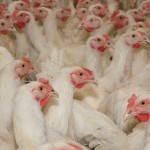
 Chicken and turkey are among the most popular and versatile foods Americans eat, but they also bring health risks to your plate.
Chicken and turkey are among the most popular and versatile foods Americans eat, but they also bring health risks to your plate.
Most factory-farmed poultry is raised with antibiotics—which leads to antibiotic resistance in humans.
Now the U.S. Department of Agriculture (USDA) wants to cut the budget for poultry inspections and allow big chicken companies to police themselves. The agency also moved recently to approve imports of processed chicken from China—a country that has had major food safety debacles.

This holiday season, will the poultry you sit down to enjoy be industrially produced, processed half a world away and full of chemicals, antibiotics and worse?
Since there are no guarantees, you may want to avoid buying poultry produced by the companies that dominate the industry. There are big reasons to avoid their chicken and turkey.
JBS/Pilgrim’s Pride, Tyson Foods, Perdue and Sanderson slaughter and process more than half of the chicken consumed in the U.S., while Butterball, Jennie-O Turkey Store and Cargill dominate the turkey business. Their outsized operations give them significant market and lobbying power. These companies act as middlemen between farmers and consumers and they eat up most of the profit in the supply chain.
Before you purchase the holiday turkey you’ll share with your loved ones in a few weeks, consider these four facts:
Because there are just a handful of players in the poultry market, a handful of companies call the shots—and reap large profits. For every $19 12-piece chicken bucket from KFC, only 25 cents goes to the farmer who raised the poultry, while less than $5 goes to the chicken processor. KFC gets the rest.
These large companies use unfair contracts, require expensive equipment and building upgrades and employ other aggressive tactics to squeeze poultry farmers to produce more and more chickens and turkeys for less and less money.
The big chicken and turkey companies own everything from the chicks and poults to the feed, trucks, slaughter facilities and the brand. The grower assumes all the debt associated with the operation, including the mortgages on the special buildings they have to construct to get a contract. The farmer also shoulders the expenses of utilities and of removing waste and dead birds.
Concentrating poultry production means concentrating the amount of waste seeping from factory farms into nearby waterways, like the Chesapeake Bay. Perdue and other big companies leave the farmers to shoulder all the responsibility for dealing with the waste.
Do you need more reasons to avoid poultry produced by these giant companies? Consider that their market power begets enormous political power—and these companies throw their weight around to make sure they can continue producing the most birds for the most profit. Plus, factory farming hurts poultry producers, consumers and the environment.
Nothing showcases the power Big Ag holds over our political leaders more than emails Food & Water Watch revealed last year between Martin O’Malley, the Democratic governor of Maryland and poultry giant Perdue.
These exchanges illustrated how Perdue’s profits from chicken sold in California and Michigan are being used to exert inappropriate power over Maryland’s governor through intense lobbying efforts on everything from poultry litter incineration to the environmental cases that a university law clinic engages in.
If you buy your chicken or turkey from the grocery store, chances are that you are buying a brand owned by one of the largest companies. Consider seeking out independent poultry farmers who sell direct to consumers instead.
Visit EcoWatch’s FACTORY FARMING page for more related news on this topic.


Leave a Reply
You must be logged in to post a comment.